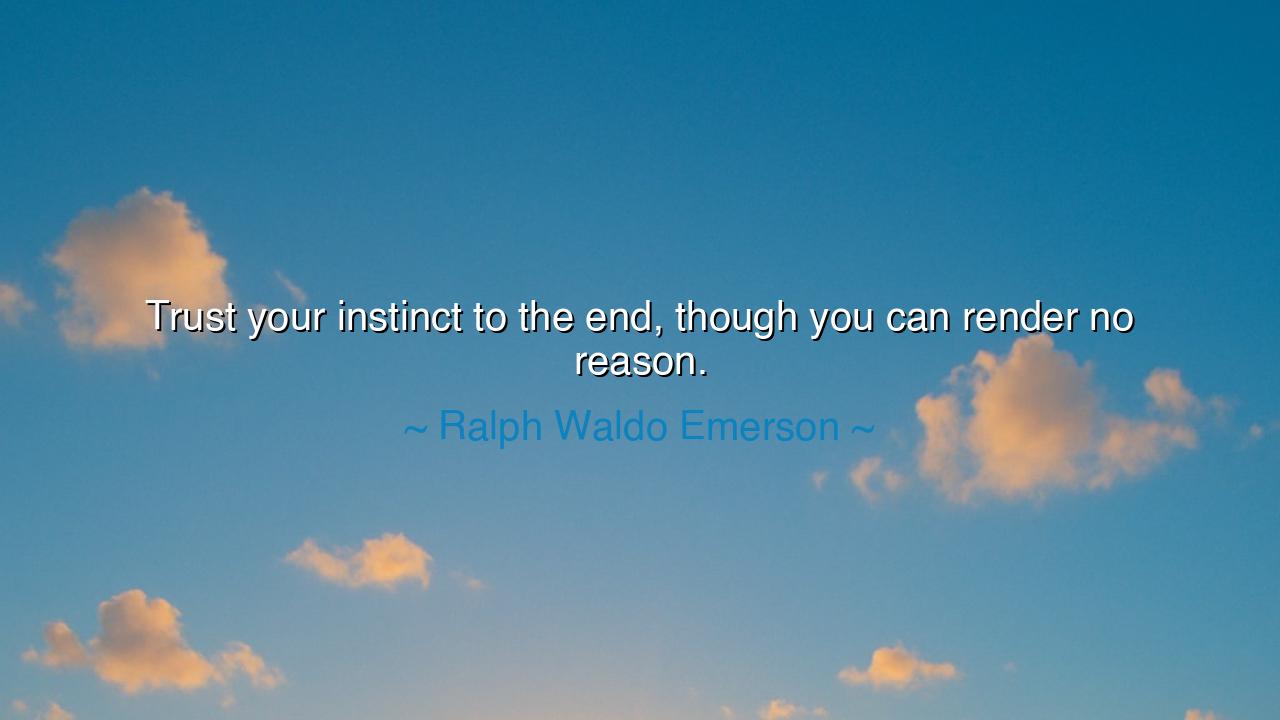
Trust your instinct to the end, though you can render no reason.






The words of Ralph Waldo Emerson—“Trust your instinct to the end, though you can render no reason”—resound like a trumpet call to the soul that hesitates. In these few syllables, Emerson reveals one of his deepest truths: that within every human being is a compass, a guiding spark placed there by nature and by Providence, which knows the way even when the mind is clouded. He bids us trust this inner voice, though it may offer no rational proof, though it may be mocked by others, though even we ourselves cannot explain it. For the instinct, born of experience, intuition, and something higher than reason, is often wiser than the cold calculations of the intellect.
The origin of these words lies in Emerson’s great philosophy of self-reliance. In his essays, he called upon men and women to trust the integrity of their own thoughts, to believe that what is true for them in the depths of their hearts is true for all mankind. To Emerson, the instinct was not mere animal impulse, but the whisper of the divine within, a truth that reason cannot always grasp but that leads the soul toward greatness. He believed that society often trains us to doubt this voice, to silence it in favor of conformity and logic, yet to do so is to betray the deepest part of ourselves.
History gives us countless examples of men and women who trusted their instincts when reason and evidence failed them. Consider Joan of Arc, a young peasant girl with no training in war, who nevertheless trusted the voice within her that told her she was called to save France. She could render no reason, no proof that her visions were real—yet by trusting her instinct she rallied an army, lifted a siege, and turned the tide of history. Her life, though short, stands as a monument to Emerson’s truth: instinct, when trusted, can accomplish what reason declares impossible.
The meaning of Emerson’s words is also deeply personal. How many times in life do we feel a pull within us, a quiet certainty that tells us to take one path and not another? And how often do we silence it, demanding reasons we cannot find? Later we discover that the instinct was right, that it had seen farther than our logic could reach. To trust one’s instinct is to honor the wisdom of the soul itself, which perceives beyond the limits of the rational mind.
Yet this teaching is not an invitation to recklessness, but to courage. It does not tell us to spurn knowledge or despise reason, but to recognize that reason is not the only lamp by which we may walk. The instinct is a light of its own, dim perhaps, but steadfast, guiding us through the shadows where reason cannot yet see. To ignore it is to stumble in darkness; to follow it is to discover a path that reason, in time, may later confirm.
The lesson for us is clear: listen for the voice within. When fear or doubt rise, when the world demands justification, dare to act upon the instinct that calls you forward. Do not wait until every reason is clear, for in waiting you may lose the moment of destiny. The great works of history, the great discoveries, the great acts of love and courage—these were often born not from reasoned plans, but from hearts that dared to trust their inner conviction.
Practically, we can train ourselves to heed this wisdom. In moments of decision, pause and ask: What does my instinct tell me? If it speaks, give it weight, even when the mind cannot explain. Begin with small things: a choice of word, a gesture of kindness, a step toward a dream. As you honor your instinct in little matters, you will learn to trust it in great ones. And when the day comes that you must take a leap, you will be ready to act with the courage Emerson commands.
Thus, Emerson’s words remain a flame for every generation: “Trust your instinct to the end, though you can render no reason.” Let them remind us that the deepest wisdom often cannot be spoken, only lived. To trust one’s instinct is to trust the divine spark within, and to live a life of daring, authenticity, and truth. And those who walk in this trust shall not stumble, for they follow a guide older than reason and truer than fear.






AAdministratorAdministrator
Welcome, honored guests. Please leave a comment, we will respond soon